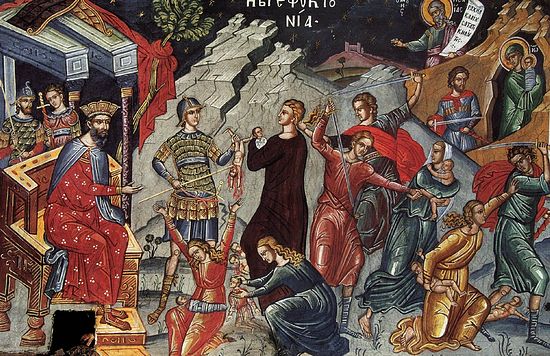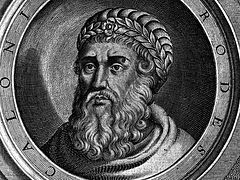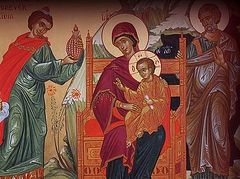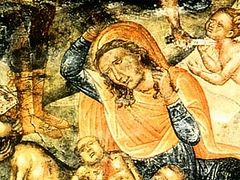In Church Slavonic and Russian, the word “Pravda” has more than one meaning in English. It is “truth”, “righteousness”, “justice”, and “law”. Therefore we will use here the words “righteousness” and “justice” interchangeably, implying all the above meanings of the word “Pravda”.
 The slaying of the holy innocents in Bethlehem.
The slaying of the holy innocents in Bethlehem.
In the name of the Father, the Son, and the Holy Spirit. Amen.
Today the Holy Church celebrates the Sunday after the Nativity, the first Sunday that falls after the feast of the Nativity according the flesh of our Lord, God, and Savior Jesus Christ. The Gospel reading that the Church offers us today tells of an event unheard of throughout human history, when King Herod, having heard from the Magi about the birth of the King of the Jews, was troubled and ordered that all the infants of Bethlehem two year of age and younger, born around the time that the Magi had named, be slain. The tyrant’s anxiety came from his fear of losing his earthly power, and the unprecedented audacity of this evil deed consisted in his rebellion against the anointed of God, Christ; for after hearing the Magi, Herod gathered all the Jewish high priests and scribes and questioned them as to where Christ was supposed to be born. Citing the words of the prophet Micah, they told him, “Bethlehem in Judah.” Thus, Herod was seeking the soul not of an ordinary child, but the Anointed One of God, about whom the prophet had foretold over seven hundred years before.
The kings of the earth were aroused, and the rulers were assembled together, against the Lord, and against His Christ (Ps. 26:2), says the prophet David, pointing to the Savior’s suffering not only on the cross on Golgotha, but throughout His life, beginning from infancy in the Bethlehem manger. For according to an explanation by St. Athanathius the Great, the “kings of the earth” are Herod and Pilate. He that dwelleth in the heavens shall laugh them to scorn, and the Lord shall deride them (Ps. 26:3), the prophet David says, as if seeing through the ages Herod being put to shame when the angel from heaven tears the innocent babe from the arms of the bloodthirsty tyrant, informing Joseph the Betrothed to in a dream to take the child and flee to Egypt. After Herod’s death, again in a dream an angel appeared to Joseph and said, Arise, and take the young child and his mother, and go into the land of Israel: for they are dead which sought the young child’s life (Matt. 2:20). Joseph submitted himself to this divine command, but hearing that Archelaus now reigned in Judaea in the place of his father Herod, he was afraid to go there. Being warned in a dream, he turned aside into the parts of Galilee (cf. Matt. 2:22).
Why did he so fear Archelaus? Because Archelaus, the son of Herod, was known to be no less cruel than his father Herod—cruelty that is an inseparable companion of the passion of ambition for power. In a fit of morbid suspicion, he ordered that on the feast of the Passover 3,000 Jews be murdered because he thought that they were not sufficiently loyal to him.
Today we also commemorate the prophet of God, David, St. Joseph the Betrothed, the apostle James, the brother of the Lord—the son of righteous Joseph from his marriage to Solomonia, his first wife. Tomorrow we also commemorate St. Dositheus, Metropolitan of Zagreb.
The life of the Savior was from the very outset a valley of sorrows, filled more with injustice than with the triumph of the Divine Incarnation heralded by the angels. This also relates to the saints we have named. We recall the prophet David; although he was the anointed King of Israel, he had to experience many sorrows and afflictions. He was persecuted by Saul, his own son rebelled against him, and he had to endure so much trouble and humiliation before he was enthroned in his kingdom. And Righteous Joseph, who received a revelation from an angel and understanding the whole, terrible responsibility placed upon him not by men but by God, undertook a dangerous journey to Egypt. According to tradition he was attacked by robbers, and endured all the difficulties of a journey through the desert. Apostle James the brother of the Lord, the first bishop of Jerusalem, was cast out of the Jerusalem temple by cruel Jews for confessing the incarnation into human nature of our Lord God and Savior Jesus Christ.
St. Dositheus had to experience no less terrible sufferings. A Serb, he was appointed to the cathedra in Zagreb, Croatia. Highly educated, an ascetic of piety and zealot of patristic tradition, he was sent to a city where he was subjected to a possibly unprecedented mockery of a hierarch—beatings and torture from the fanatical Catholic Ustashi. After the beatings he was sent to a hospital were just as fanatical Catholic nuns scourged him and tore out his beard. He soon died from these sufferings and departed to the Lord, and in the year 2000 was canonized by the Serbian Orthodox Church as a confessor of the faith.
In contemplating these events, the question involuntarily arises in us: Why is there so much injustice in the world? Why were the 14,000 innocent infants allowed to perish? Why did King David, Apostle James, and St. Dositheus suffer? Where is justice in this? If we think about origin of this word, we of course connect it with the word, “just”, justness or righteousness, or “the right hand”.
“There is the justice that is within us, which demands that we give each according to his due; and although we do not attain to this exactly, nevertheless if we act with a righteous disposition we do not depart far from our aim”, says St. Basil the Great. “And there is justice that reaches us from the Heavens from the righteous Judge—a justice that now corrects us, now rewards us, in which there is much that is unfathomable to us because of the heights of determination contained in it.” His righteousness abideth unto ages of ages (Ps. 111:8), as the prophet David hymns, as if indicating by this that righteousness has a dividing line—the line of the threshold to eternity. This, according to St. John Chrysostom, was spoken by the prophet David for the sake of those who are tempted by the misfortunes that befall some. He teaches them thus: “Do not be confused when you see people being slandered or the innocent suffering. There are dispassionate fates that beset people, to each according as he deserves. If you should demand that this sentence be executed immediately, beware that you do not pronounce it against yourself.” These are terrible words. What should we do? Our human justice is imperfect, while divine justice can at times be unfathomable and mysteriously hidden from us.
“Blessed is he who is righteous with God’s righteousness, for they are concentrated in Christ”, as the great holy hierarch of the Russian Orthodox Church St. Ignatius (Brianchininov) resolves this perplexity. “Unfortunate is he who is content with his own human justice, if he does not need Christ Who said of Himself, I came not to call the righteous but sinners to repentance.” But just the same, how can we bring to our limited, imperfect human and heart the understanding of that divine righteousness, which is often incomprehensible to us. St. Ignatius gives us this explanation: “Divine justice was made manifest to humanity through divine mercy, and it commands us to be like God in His perfect mercy, and in no other virtue. Then our justice will soar like an eagle in the heavens, receiving wings to enable it to reach eternity, unto the ages of ages, and will become capable of crossing over that threshold between [earthly] existence and eternal life. And is mercy really so magnificent that it can give a clear testimony to us on earth of the fullness of divine justice, great and incomprehensible to us? Yes, it can.
Once when we were young we made a pilgrimage—it was the early 1980s—to a very ancient monastery not far from Tbilisi (Georgia). This monastery is called Betania, which means in Georgian “Bethany”. There we encountered an extraordinary occurrence. The monastery was small. Everyday the abbot, whose name was John, and the hierodeacon, named George, served the Liturgy, sometimes with pilgrims—rare because it was difficult to get there, only by foot or in an all-terrain vehicle, to this monastery hidden in a mountainous place. So, one day, a man came named Guram came to the monastery. Everyone knew him in Tbilisi, where they considered him to be a good-for-nothing drunk, who was always begging money near the churches. They assumed that he spent the money on drink or some other impious things. Many held him in contempt, and it never occurred to anyone that that man was carrying out a secret podvig. In fact, he used the money he collected to help people in extreme need—widows, misfortunate orphans, and people with incurable diseases who had no one to take care of them. So, this man disdained by all came to the monastery, confessed to the abbot, and revealed the secret of his life. After receiving Communion, Guram departed to the Lord. And then what happened? At God’s secret command, the Patriarch and six bishops of the Georgian Church, as if following some strange call of the heart yet all for their own reasons, came to the monastery and served this man’s funeral. That is how the commandment of mercy destroyed the wall between earthly justice and heavenly justice.
Let us be attentive to this and remember the power of this virtue, according to the words of the prophet David, I will confess Thee with uprightness of heart, when I have learned the judgements of Thy righteousness; let us learn God’s righteousness through His judgments—which are not only easy to understand but also possible to carry out on our earthly journey. Amen.



